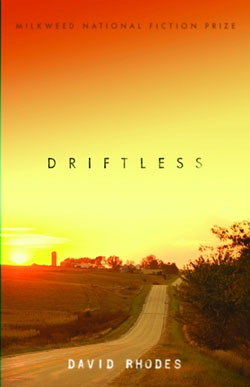Driftless
by David Rhodes
reviewed by Anis Shivani
By 1976, young David Rhodes had already published three critically praised novels, the last being Rock Island Line, acclaimed by John Gardner in On Becoming a Novelist. A motorcycle accident paralyzed him that year, and he fell silent. After thirty years, Rhodes has delivered, in Driftless, a version of midwestern pastoral that shoots him to the highest rank of American writers. Together, the two books constitute a credible idealization of the American character, free from its political reductions, as worthy of attention as Franklin, Paine, Jefferson, Twain, and Hemingway’s characterizations of the ideal American.
Leo Marx, in the classic The Machine in the Garden, focused on the attempt to reconcile technology and nature in the American pastoral. Rhodes offers a different interpretation: the vulnerability of the pastoral to death. July Montgomery is the thread between Rock Island Line (reissued by Milkweed) and Driftless. In Rock Island Line, a series of deaths short circuits July’s happiness. His parents die in a car accident when he is ten. Running away to Philadelphia, he lives underground in a subway station and comes of age with his rural straightforwardness, even innocence, intact. Paradise is temporarily regained when as an adult he returns to Iowa, only to be lost again when his wife is raped and murdered. July wanders for years before settling in Words, Wisconsin, where we pick up in Driftless.
For pastoral to work, place must beneficently shape character. Rhodes achieves this, as in his descriptions of the wintry Wisconsin landscape, without romanticizing the midwestern farmer’s hardy virtues.
The ensemble characters of Driftless are all splinters of July’s original character. Jacob Helm, repairman, has long grieved the loss of his wife Angela. Grahm and Cora Shotwell, with their two young children, struggle to make their dairy farm pay amid discovery of systematic fraud by their milk cooperative. Gail, Grahm’s sister, is a talented singer for a local band with a gift for deep melancholy. Rusty Smith, a retired farmer, is gradually losing his faculties (evocative of Wilson in Rock Island Line). Violet Brasso, active in the church, takes care of her invalid sister Olivia. Winifred Smith, the Friends church pastor, has a transcendental vision of God, which she yearns to verbalize.
Unlike urban protagonists paralyzed by self-consciousness, Rhodes’s characters are capable of great leaps of intuition and action. Jacob improbably falls in love with Winifred, moving past the loss of his wife. With July’s help, Grahm and Cora’s effort to expose the milk cooperative finally gets traction. The young couple’s unsullied faith in American values is neither sentimentalized nor patronized. Rusty Smith turns out to be Winifred’s uncle, closing that unfortunate gap in his life. Gail remains true to herself by not altering her music to please the successful singer Barbara Jean. Olivia miraculously regains the use of her legs, allowing her feistiness to bloom. While Words seems to be evolving toward integrity and resolution, July dies on his farm, mangled by the tractor, alone. Jacob and Winifred marvel at the “look of death,” after one of the most moving descriptions of death in American fiction.
July might have died, but the pastoral ideal is timeless. His independence, freedom from cant, stoicism, skepticism toward any ideology (including theology), and ability to work in the midst of tragedy, live on in the remaining characters. An urban outsider might imagine today’s midwestern farm economy as threatened by vast economic transformations. From the inside, as Rhodes writes, only the soul’s struggle against death matters. If one is rooted enough in a place, is freedom from anonymity—a kind of untainted, simplified immortality—possible? Rhodes’s is a heady antidote to the urban solipsism dominant in our fiction.
Much of our greatest fiction has been written in the so-called regional vein, which, paradoxically, lays the best claim to universality. One wonders what Rhodes might have achieved had he, like Faulkner, been able to build a more substantial body of work, engaged with essentially the same character type, immortalizing the ideal moral cadence of the rural Midwest. But then, perhaps, he already has.
Published on March 6, 2015

